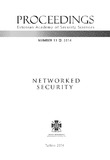Proceedings Estonian Academy of Security Sciences, 13 : Networked security

Vaata/
Kuupäev
2014Autor
Tabur, Lauri, peatoimetaja
Loik, Ramon, tegevtoimetaja
Lees, Merike, tegevtoimetaja
Vernik, Jako, kaasautor
Järvet, Shvea, kaasautor
Saar, Indrek, kaasautor
Suve, Priit, kaasautor
Valk, Anne, kaasautor
Chersan, Ileana, kaasautor
Randlane, Kerly, kaasautor
Silberg, Uno, kaasautor
Güldenkoh, Maret, kaasautor
Elling, Tõnis, kaasautor
Tammert, Paul, kaasautor
Kratovitš, Mairit, kaasautor
Aron, Sirli, kaasautor
Metadata
Näita täielikku nimetuse kirjetKokkuvõte
The present issue of Proceedings is opened by a joint piece by Jako Vernik and Shvea Järvet comparing various approaches to set up voluntary maritime rescue motivators by state officials and by volunteers themselves. Volunteer participation in search and rescue ope rations at sea is a very topical issue in the field of internal security in Estonia. The second contribution in the issue is by a group of authors led by the Assistant Professor of Estonian Academy of Security Sciences Indrek Saar. Their paper examines the effect of local public expenditures on crime during the period of 2007–2012 in Estonia. For that purpose, several spatial and non-spatial fi xed eff ects panel regression models are estimated. Th e authors’ disclose that one additional euro spent per inhabitant on public order and safety decreases the number of crimes per 1.000 of the population by 0.6–1 per cent. The article by Priit Suve arises from the previous findings that the police have always been seen as a mediator between the state and the people, at least in terms of safety. For that reason, knowledge of how people receive and perceive functions of police specified in the state regulations is inevitably important for both parts. It is also important for the police since they use this knowledge to improve their performance, which has significant impact on our lives. The fourth contribution to the Proceedings comes from a team of authors led by Anne Valk, the Head of the Centre of Law and social Sciences at the Estonian Academy of Security Sciences. The aim of the authors is to investigate the insights into internal security disciplines lecturers’ roles according to diverse stakeholders and the existence of controversial expectations regarding these roles. The last article of our current issue of the Proceedings comes from our colleague from the Police Academy of Bukarest, Ileana Chersan. Her written piece on teaching contemporary Law Enforcement English vocabulary using alternative sources starts with a finding that teaching a language for special purposes involves the acquisition of linguistic competences as well as cross-cultural and professional communication skills.
Kirjeldus
Volunteer involvement to ensure better maritime rescue capabilities: A comparative approach to describing volunteering and its motivators by state offi cials and volunteers / Jako Vernik, Shvea Järvet ; Crime reducing eff ects of local government spending in Estonia / Indrek Saar et al. ; Two perspectives of police functions: discourse analysis with the example of Estonia’s security policy / Priit Suve ; Insights into the Public Defence Speciality Lecturer´s Roles in the Institution of Professional Higher Education and the Controversial Role Expectations in Developing Their Professional Identity / Anne Valk et al. ; Teaching Law Enforcement English vocabulary using alternative sources / Ileana Chersan


